Download high resolution images.
The arrival of the 2024 gardening season is upon us, which might leave many wondering what flowers to plant this season. Luckily, a list of great possibilities comes from Colorado State University’s Annual Flower Trial Garden.
The garden focuses on Northern Colorado research and outreach across its three acres on the east side of its Fort Collins campus. Each year, the Annual Flower Trial Gardens analyzes and tests the performance of more than 1,000 varieties of annual bedding plants in Colorado’s harsh growing conditions. Dozens of expert evaluators rate the plants for growth pattern, vigor, bloom, and other characteristics. The trial results help home gardeners identify annual bedding plants that are more likely to succeed.
Winners from the 2023 evaluation are now available at area nurseries and garden centers for the 2024 home gardening season. For more detailed descriptions and photographs, visit the Flower Trial Garden website.
About the Trial Garden
CSU’s Flower Trial Garden draws in thousands of visitors annually and relies solely on student gardeners, volunteers and industry supporters and experts, who help provide detailed analysis of plant performance. Colorado State Extension Master Gardeners play a critical role in the garden’s maintenance and care, which results in valuable research utilized by industry and home gardeners alike. Due to the Rocky Mountain region’s unique growing conditions, such as high altitude, drying winds, intense solar radiation, and large fluctuations between day and night temperatures, regional growth analysis is critical.
The Trial Garden receives no direct state or public funding. It is funded primarily by fees from plant-breeding companies that submit entries to the trials. The garden also receives donations from foundations, industry associations, nurseries, plant producers and other green industry companies.
"Best Of" Annual Flower Winners from the 2023 CSU Trials
Below are a select few of the several best-performing annual plants from the 2023 CSU Annual trial program. Look for these in your garden centers to plant in your garden to enjoy this summer. For all the 2023 CSU Annual Trial Winners, visit the CSU Flower Garden Trials website.
Best of Show – Dahlia Dahlegria™ Apricot Tricolor
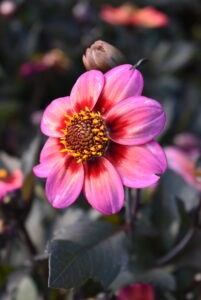
This entry holds the distinction of winning the “Best of Show” from both the industry and public evaluations! This plant is stunning on many levels. The single row of petals is a stunning combination of apricot, yellow, raspberry, and magenta, with a sunshine yellow eye. The flowers are contrasted with the dark purple foliage, making it a beautiful plant without flowers! The bees and other pollinators abound with this floriferous dahlia. Plant developed by Syngenta®.
Best New Variety – Stonehedge Rose Bronze Leaf
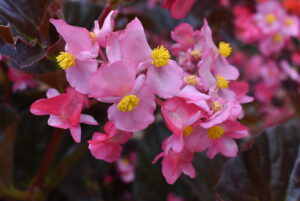 Talk about a descriptive plant name! These hybrid begonias have excellent vigor, never look tired, and seemingly look better each week, right up until the first frost. The large plants (up to 4’ tall!) are very uniform and strong-stemmed. They are loaded with bright rose-colored flowers held high above the heart-shaped bronze-purple-colored foliage. Plant these and ‘wow’ your neighbors and friends! Plant developed by Benary®.
Talk about a descriptive plant name! These hybrid begonias have excellent vigor, never look tired, and seemingly look better each week, right up until the first frost. The large plants (up to 4’ tall!) are very uniform and strong-stemmed. They are loaded with bright rose-colored flowers held high above the heart-shaped bronze-purple-colored foliage. Plant these and ‘wow’ your neighbors and friends! Plant developed by Benary®.
Best Novelty – Centaurea FanciFillers™ Chrome Fountain
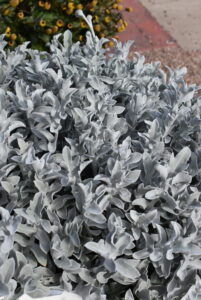
This soft, silver-gray foliage plant works great to contrast other plants in a container or in the landscape. It also looks great by itself. The rosettes of leaves provide a medium to coarse texture and an overall appearance that always looks very fresh and crisp. It’s also heat and drought-tolerant! Late in the season, it may develop a spike of yellow, puffy-looking flowers, that can be fun too, adding to a potential fall display. If you like Dusty Miller, give this one a try! Plant developed by Westhoff.
Other 2023 Best Of plant varieties to consider….
Best Lantana trialed in the ground – Lucky™ Sunrise Rose
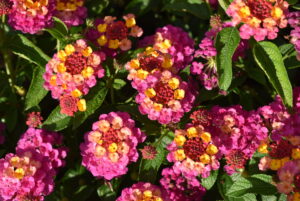
Looking for a plant that can handle warm temps, lower water requirements, AND attracts a lot of pollinators? Then you’ve found a good plant. This multi-year award winner produces an abundance of bright flowers in a harmonious mix of colors—something akin to a sunrise. Plant developed by Ball FloraPlant®.
Best Rudbeckia trialed in the ground – Sunbeckia® Luna
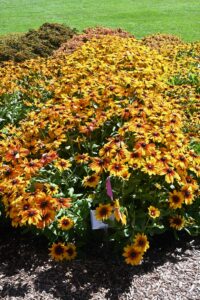
If you like daisy-type flowers, this rudbeckia is for you! In fact, all of the Sunbeckia® series would be great additions to your landscape. The deep yellow with dark rusty-red flowers are large at ~4 to 6”, producing an abundant number of flowers on strong stems. One of the great things about Luna is that the rust color bleeds more and more into the yellow as it matures, creating a dynamic color pattern. This plant is also one of the pollinators’ favorites. Plant developed by Bull Plant Genetics.
Best Zonal Geranium trialed in the ground – Galaxy™ Pink
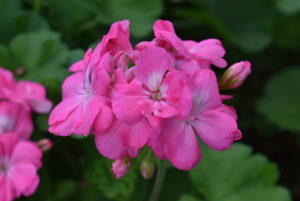
We can’t overlook the ever-popular geranium! All of The Galaxy™ series entries last year, received lots of attention. But the Galaxy™ Pink edged out the others for the top spot. The pink was crisp and clean, and the uniform plants performed quite well, even with a bit of shade in the afternoon. The nice round umbel of flowers was held well above the foliage, so they could be easily enjoyed. If you like geraniums…. these are stars for sure! Plant developed by Ball FloraPlant®.
Best Torenia – Summer Wave® Bouquet White 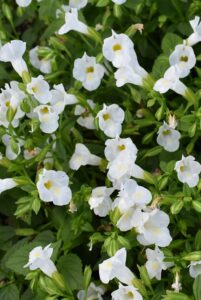
Also known as the wishbone flower (check out the inside of the flower—the male reproductive parts form a wishbone!) is a great option if you need a shade-loving plant! These vigorous plants produced loads of crisp, white flowers, all the way into September. The dark green foliage was blemish-free, contrasting the white cupped flowers. The lower growing habit was very uniform overall, and it would make a great plant for the shaded areas. Plant developed by Suntory.
Best Mini Petunia trialed in the ground – Supertunia Mini Vista® Pink Star
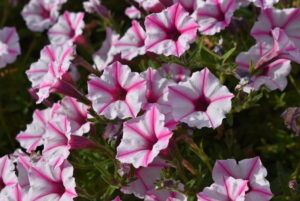 No doubt, there are lots of petunias to choose from in the garden centers. This series is known for its small flowers that are about 1” across, hence, the ‘mini. The entire Supertunia Mini Vista® series had excellent performance reviews in the trials last year, and it was hard to choose just one! But Pink Star flowered just a bit later into the season, so it came out on top. Pink Star created a near-solid carpet of color the whole summer with its mini pink and white flowers. This one won’t disappoint. Plant developed by Proven Winners®.
No doubt, there are lots of petunias to choose from in the garden centers. This series is known for its small flowers that are about 1” across, hence, the ‘mini. The entire Supertunia Mini Vista® series had excellent performance reviews in the trials last year, and it was hard to choose just one! But Pink Star flowered just a bit later into the season, so it came out on top. Pink Star created a near-solid carpet of color the whole summer with its mini pink and white flowers. This one won’t disappoint. Plant developed by Proven Winners®.
Evaluation
The trial evaluation was held on August 8, 2024. Judges consisting of industry representatives, master gardeners, university employees and trial garden advisory committee members evaluated the plant varieties for performance using a combination of these criteria:
Plant Quality:
- Uniformity of plant habit
- Bushy, well-branched shape versus open and leggy
- Healthy foliage (deep green versus chlorotic, yellow leaves)
- Foliage texture
- Disease resistance
Flower Quality:
- Flower power (number of flowers per plant, substance, and holding power)
- Flower presentation (i.e. not hidden by the foliage)
- Color uniformity
- Stable color (resistance to fading) and stable pattern (for bicolor)
- Flower size and uniformity of flowers
- Balance of color in a mixture
Overall Presentation:
- Overall “clean” look, versus visible spent blooms
- Fragrant flowers and/or foliage
- Good vigorous growth
- Resistance to climatic stress
- Novelty value of unique features
- Overall consumer appeal
Plant varieties were rated on a scale of 1 to 5 (1 = very poor performance; 5 = excellent performance). These numerical evaluations were used to calculate the average ratings for each variety in the trials. Participants used their tablets or cell phones to electronically evaluate the plants. The pre-generated comments they could choose from included: Low vigor, Vigorous plant, Few flowers, Many flowers, Uniform, Non-uniform, Unique color and some chlorosis.
Selection of ‘Best Of’ Winners and ‘Other Outstanding Plants’
Ratings from all evaluators on Aug. 9 were averaged, and the top five in each class were placed on a preliminary list. A class is determined to be any group of plants in the same genus that consists of 10 or more trial entries. The “Best Of” award was given to classes whose top-five list had ratings of at least 3.0 and one of them could be considered superior. A sub-committee of university and industry representatives revisited the garden on Sept. 8 to review the top-five list and verify the superiority of the top-rated varieties later in the season. A majority vote was taken for each class to determine the final selections for winners.